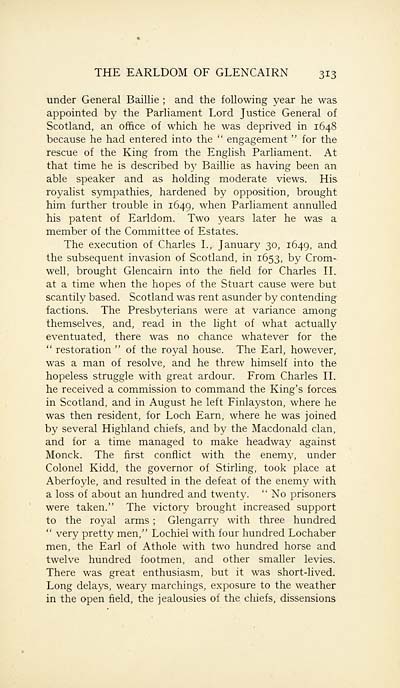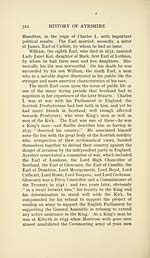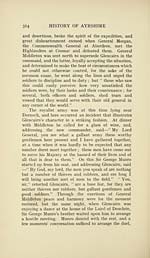Download files
Complete book:
Individual page:
Thumbnail gallery: Grid view | List view

THE EARLDOM OF GLENCAIRN 313
under General Baillie ; and the following year he was
appointed by the Parliament Lord Justice General of
Scotland, an office of which he was deprived in 1648
because he had entered into the " engagement " for the
rescue of the King from the English Parliament. At
that time he is described by Baillie as having been an
able speaker and as holding moderate views. His
royalist sympathies, hardened by opposition, brought
him further trouble in 1649, when Parliament annulled
his patent of Earldom. Two years later he was a
member of the Committee of Estates.
The execution of Charles I., January 30, 1649, an( i
the subsequent invasion of Scotland, in 1653, by Crom-
well, brought Glencairn into the field for Charles II.
at a time when the hopes of the Stuart cause were but
scantily based. Scotland was rent asunder by contending
factions. The Presbyterians were at variance among
themselves, and, read in the light of what actually
eventuated, there was no chance whatever for the
" restoration " of the royal house. The Earl, however,
was a man of resolve, and he threw himself into the
hopeless struggle with great ardour. From Charles II.
he received a commission to command the King's forces
in Scotland, and in August he left Finlayston, where he
was then resident, for Loch Earn, where he was joined
by several Highland chiefs, and by the Macdonald clan,
and for a time managed to make headway against
Monck. The first conflict with the enemy, under
Colonel Kidd, the governor of Stirling, took place at
Aberfoyle, and resulted in the defeat of the enemy with
a loss of about an hundred and twenty. " No prisoners
were taken." The victory brought increased support
to the royal arms ; Glengarry with three hundred
" very pretty men," Lochiei with four hundred Lochaber
men, the Earl of Athole with two hundred horse and
twelve hundred footmen, and other smaller levies.
There was great enthusiasm, but it was short-lived.
Long delays, weary marchings, exposure to the weather
in the open field, the jealousies of the cliiefs, dissensions
under General Baillie ; and the following year he was
appointed by the Parliament Lord Justice General of
Scotland, an office of which he was deprived in 1648
because he had entered into the " engagement " for the
rescue of the King from the English Parliament. At
that time he is described by Baillie as having been an
able speaker and as holding moderate views. His
royalist sympathies, hardened by opposition, brought
him further trouble in 1649, when Parliament annulled
his patent of Earldom. Two years later he was a
member of the Committee of Estates.
The execution of Charles I., January 30, 1649, an( i
the subsequent invasion of Scotland, in 1653, by Crom-
well, brought Glencairn into the field for Charles II.
at a time when the hopes of the Stuart cause were but
scantily based. Scotland was rent asunder by contending
factions. The Presbyterians were at variance among
themselves, and, read in the light of what actually
eventuated, there was no chance whatever for the
" restoration " of the royal house. The Earl, however,
was a man of resolve, and he threw himself into the
hopeless struggle with great ardour. From Charles II.
he received a commission to command the King's forces
in Scotland, and in August he left Finlayston, where he
was then resident, for Loch Earn, where he was joined
by several Highland chiefs, and by the Macdonald clan,
and for a time managed to make headway against
Monck. The first conflict with the enemy, under
Colonel Kidd, the governor of Stirling, took place at
Aberfoyle, and resulted in the defeat of the enemy with
a loss of about an hundred and twenty. " No prisoners
were taken." The victory brought increased support
to the royal arms ; Glengarry with three hundred
" very pretty men," Lochiei with four hundred Lochaber
men, the Earl of Athole with two hundred horse and
twelve hundred footmen, and other smaller levies.
There was great enthusiasm, but it was short-lived.
Long delays, weary marchings, exposure to the weather
in the open field, the jealousies of the cliiefs, dissensions
Set display mode to:
![]() Universal Viewer |
Universal Viewer | ![]() Mirador |
Large image | Transcription
Mirador |
Large image | Transcription
Images and transcriptions on this page, including medium image downloads, may be used under the Creative Commons Attribution 4.0 International Licence unless otherwise stated. ![]()
| Histories of Scottish families > Ayrshire > Volume 2 > (323) Page 313 |
|---|
| Permanent URL | https://digital.nls.uk/95192974 |
|---|
| Attribution and copyright: |
|
|---|---|
| Description | A selection of almost 400 printed items relating to the history of Scottish families, mostly dating from the 19th and early 20th centuries. Includes memoirs, genealogies and clan histories, with a few produced by emigrant families. The earliest family history goes back to AD 916. |
|---|

